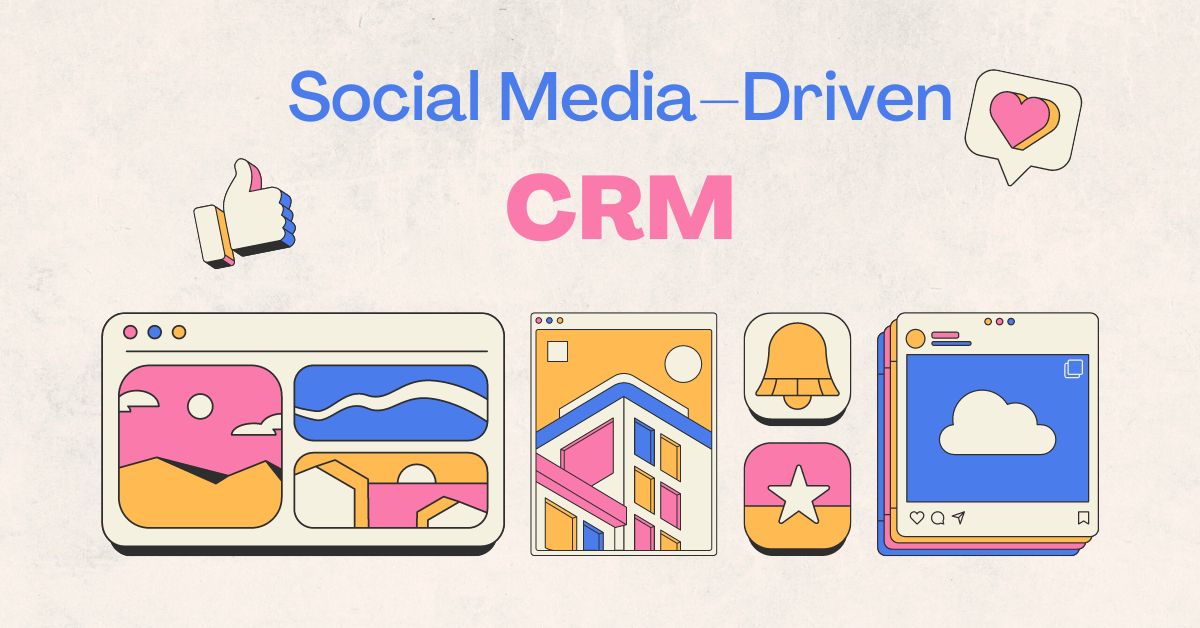 ChatGPT
ChatGPT
 Grok
Grok
 Perplexity AI
Perplexity AI

4 min read | By Postpublisher P | 09 August 2023 |
Utilising social media has become an essential component of Customer Relationship Management (CRM) in the digital age, as interactions between organisations and customers transcend physical boundaries. Social media platforms have progressed from being merely communication tools to become effective conduits for brand marketing, customer connection, and data collection.
This article examines the benefits, tactics, best practices, real-world success stories, obstacles, and future prospects of integrating social media in CRM systems to improve customer interaction.

Social media platforms are dynamic spaces for people to share their thoughts, ideas, and facts. Brands understand the need of having a presence on platforms such as Facebook, Twitter, Instagram, and LinkedIn in order to engage with their target audience, raise brand awareness, and encourage consumer loyalty.
Consumer Relationship Management has progressed from traditional database management to a more holistic strategy centred on providing excellent client experience. Social media is one of the many touch points via which clients connect with a brand in modern CRM.
Integrating social media with CRM software has numerous benefits. It enables organisations to collect real-time consumer insights, personalise interactions, and solve customer issues proactively. Organization’s may establish a unified view of each customer’s journey by linking social media activity with CRM data.

Social media networks generate a steady supply of information about client preferences, behaviors, and opinions. Integrating this data with CRM systems enables organizations to acquire a more in-depth understanding of client demands and trends.
Brands can use social listening tools to track comments about their products or services. This provides a window into customer feelings, allowing businesses to modify their strategy accordingly.
Businesses may produce material that resonates with specific customers by analyzing social media interactions, improving the likelihood of engagement and conversion.
Brands may provide contextually relevant communication by integrating social media interactions with CRM data. This results in a consistent and personalized consumer experience.
Monitoring social media allows firms to quickly identify and respond to customer complaints, exhibiting responsiveness and commitment to customer happiness.
Companies can avoid possible public relations catastrophes and preserve a positive brand image by quickly responding to unwanted comments or issues on social media.

Different social media networks appeal to different demographics. Understanding these demographics is critical when choosing platforms that correspond to a brand’s target audience.
Choosing platforms that are aligned with corporate goals ensures that resources are appropriately deployed, and efforts contribute to the intended results.
To ensure accuracy and consistency, seamless integration of social media data with CRM systems necessitates comprehensive data management methods.
Data analysis tools allow data-driven decision-making by extracting actionable insights from integrated data.
Organising social media interactions with other customer data results in a more complete picture of each client, which improves engagement methods.
A single customer view helps customers to navigate seamlessly between social media and other contact channels.

Monitoring brand mentions and conversations on social media on a regular basis can assist find chances for involvement and issue resolution.
Businesses may collaborate and expand their reach by identifying popular social media users and brand advocates.
Listening to consumer concerns and feedback in a timely manner demonstrates a brand’s dedication to client happiness.
Chatbots can offer immediate support, improving the user experience and shortening response times.
Sharing user-generated content showcases genuine consumer experiences, which fosters a sense of community.
As customers’ voices take centre stage, user-generated content helps to develop an authentic brand image.
Using quick social media response and resolution, a corporation turned a disappointed consumer into a committed advocate.
Researching how one brand used social media data to develop hyper-personalised marketing campaigns that resulted in higher engagement and revenues.
Researching how a brand used social media virality to successfully promote new items and generate enthusiasm.
Managing the problems of handling sensitive customer data while adhering to privacy requirements.
Strategies for efficiently managing unfavourable press and transforming setbacks into opportunities for growth.
Allocating resources effectively and offering staff training for effective social media-assisted CRM implementation.
Understanding the possibilities of artificial intelligence and predictive analytics to improve customer interaction and provide proactive support.
Imagining the integration of social media-driven CRM with other developing communication channels for a more seamless customer experience.
Focusing on the significance of adhering to ethical norms when acquiring, using, and managing customer data received through social media.
Social media and CRM software provides organizations with unparalleled opportunities to improve consumer interaction, establish brand loyalty, and drive growth. Organizations can unleash the full potential of social media-driven CRM by harnessing the benefits, implementing successful strategies, and adhering to best practices. This will pave the way for a future in which customer relationships are fostered and deepened through digital interactions.
Join over 150,000+ subscribers who get our best digital insights, strategies and tips delivered straight to their inbox.